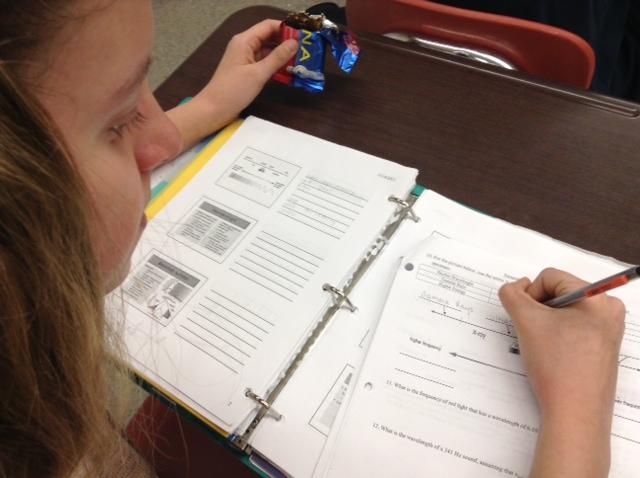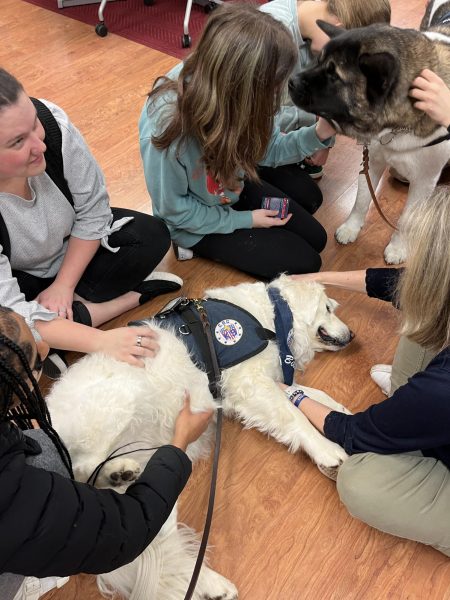For Exams, a Little Bit of Anxiety May Be Just the Thing
Stressed out by the big tests? Try some practice questions and keep things in perspective
Freshman Claire Connors studies for her science final during conferences Jan. 15.

Finals.
They’re intimidating, panic-inducing and all-around terrifying.
And that anxiety can be catching.
“Sophomores and juniors I know are taking AP and IB classes, and their finals seem a lot harder, so I’m nervous for mine, too,” freshman Claire Connors said. “I want to be able to answer every question.”
Senior Lauren Jenson takes IB classes. Her math and science finals cover what she learned junior year in addition to this year. As a freshman, Jenson recalled being “extremely nervous” for finals.
“It was the first big test I’d taken,” she said, adding that it was “more intimidating because it was high school.”
There are those students who only experience a few jitters before an exam. Others suffer seriously from test anxiety. “They make the test about more than it should be,” said clinical psychologist Lisa Damour of Case Western Reserve University, who directs the Center for Research on Girls at Laurel School.“So rather than approaching the test thinking, ‘This is my chance to show what I know about this material today,’ they approach the test thinking, ‘How I do on this test determines where I go to college.’ ”
Some students can even start to unconsciously worry that doing badly on a test will confirm a negative stereotype about their race or gender. For example, an African-American student might become nervous because he doesn’t want to do poorly and confirm a negative stereotype about African-American academic skill. Or, a girl may be anxious that scoring poorly on a math or science exam will help prove that girls are naturally weak in those subjects.
This psychological phenomenon, called stereotype threat, also produces test anxiety.
“Because very few students know about stereotype threat, all they notice is, ‘Wow, I feel really anxious,’ and then their test performance starts to suffer,” Damour said.
Similar to the idea of stereotype threat, an article published in the Journal of Abnormal Child Psychology stated that “fear of negative evaluation” is the “core-fear of test-anxious individuals.”

Sophomore Kobe Saunders is nervous but ready.
“A huge test that affects my grade scares me,” Saunders said. “But I practiced good study habits this year.”
Damour explained that students need to choose the right way to study in order to avoid test anxiety. “They should study by putting themselves in practice test conditions . . . write sample questions or find sample questions,” she said. “Students as a group spend way too much time reading and reviewing.”
“If you just read and review,” said Damour, “and then walk into the test, that would be like preparing for a play by just going over your lines but never having dress rehearsal and the test is opening night.”
Saunders recommended forming study groups. “Don’t be nervous,” he said. “Don’t stress out.”
“Freshmen should use finals as a chance to figure out what teachers expect,” said Jenson. “Talk to your teachers about any questions you have . . . don’t feel stupid asking questions in class.”
Some teachers assign alternative finals, such as a project or essay, for students to take home. Alternative finals replace the standard sit-down test. “Students can relax a little more with all the studying,” Rebecca Marcus wrote in a May 10, 2013 Shakerite column. “The projects are more fun and less stressful than a test.”
Connors agreed that alternative finals would produce “a lot less stress.”
But, Damour pointed out that you can’t avoid the challenge of an exam forever.
“Students . . . don’t have to work with time constraints,” said Damour of the alternative finals. However, “tests are a part of life. Getting good at test-taking is a skill.”
Damour also explained that it’s OK to be a little nervous before a big test. “What we know is, some anxiety is a good thing,” she said. “But I think because we talk about test anxiety so much that sometimes when students start to feel a little bit of anxiety, they worry that something is wrong.”
“It’s important,” said Damour, “for students to know that a little bit of anxiety is actually going to improve their test performance.”






